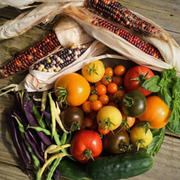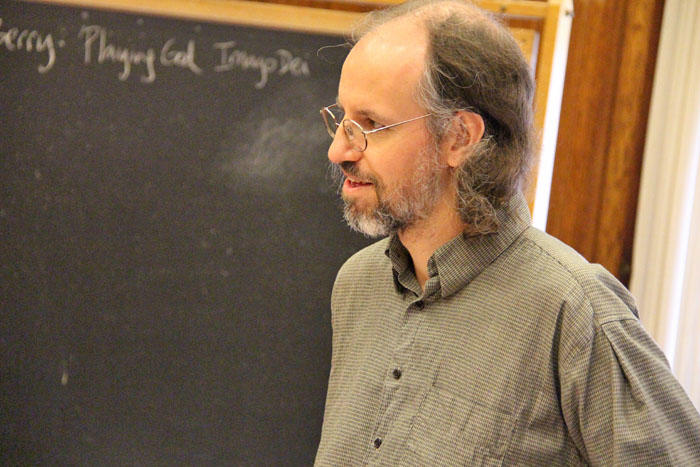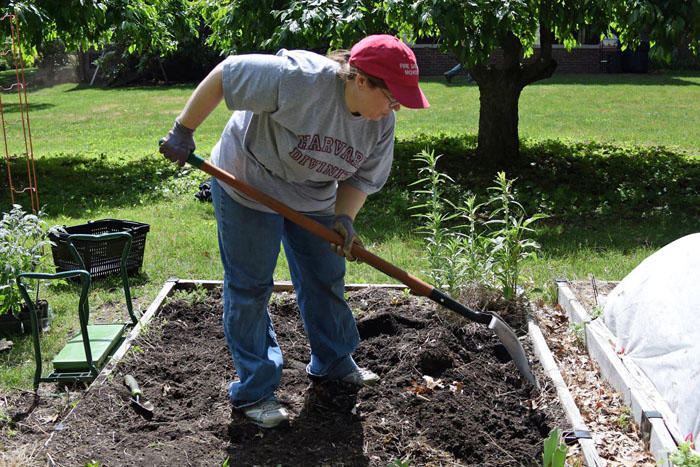
At a Noon Service hosted in the spring by the HDS Garden Group, the Rev. Dr. María Cristina Vlassidis Burgoa, MDiv ’07, ThD ’16, shared a single ear of multicolored corn with those present.
Vlassidis Burgoa, who was studying indigenous traditions and liberation theology and is now a Unitarian Universalist minister, had personally grown the corn, and she gave each person at the service one of the brightly colored kernels. One of the service participants, Maggie Krueger, MTS candidate, who studies the spiritual and ethical dimensions of food, said the moment was powerful.
“Since each of those tiny pieces could grow a whole new corn plant, she had really given us life in that kernel,” Krueger explained.
Food has long been a focal point of religious rituals and traditions, from the offering of ghee to Hindu gods, to Jewish laws allowing the needy to glean leftover crops during harvest, to the bread and wine consumed in the Christian Eucharist, to the Islamic celebration of Eid al-Fitr, when Muslims break the Ramadan fast.
More and more, however, scholars and religious practitioners at Harvard Divinity School and elsewhere have been looking at food in new ways. They are raising questions about the ethics of food production and distribution, about agriculture’s impact on the environment, about the conditions of those who grow and prepare our food, and about differential access to nutrition in “food deserts.”
As Krueger put it: “Divinity schools do a great job of charting the way we look at something. Though food is treated very mundanely, it’s something sacred for almost every faith and we need to treat it differently.”
Cultivating Connections
Though food figures prominently in many disparate religions, it has been understood and engaged in very different ways across religious cosmologies, rituals, and ethical systems.
This semester, HDS professor Dan McKanan is teaching a course on the intersection of religion with ecology, sometimes called “ecotheology”—an area of scholarship that has grown exponentially since 1990. He said that, broadly speaking, the Abrahamic religions of Judaism, Christianity, and Islam have a more human-centered understanding of the universe, so their ethical involvements with food have tended to focus on social justice questions, such as whether people have enough to eat and whether workers are treated fairly.
“However,” McKanan said, “in this era in which pollution and the consequences of climate change are widespread and unequally distributed, there are strong arguments to be made vis-à-vis the earth on a purely human-to-human basis. On the other hand, in other religious-ethical traditions, there’s a direct responsibility to non-human creatures or ecosystems as a whole.”
Lately, McKanan has been researching the surprising spiritual roots of the modern organic agriculture movement. In the West, organic farming—as opposed to farming with industrially produced fertilizers and pesticides—can be traced to an Austrian thinker named Rudolf Steiner and his mystically tinged “biodynamic agriculture.” His followers viewed each farm as a single organism and planted seeds according to an astrological calendar.

Today, organic agriculture has spread beyond that esoteric spiritual movement to become a widespread practice endorsed by environmentalists of different faiths—and of no faith at all. McKanan pointed out that many mainstream Christian congregations have become drop sites for produce from organic farms that participate in community supported agriculture (CSA) programs.
“A lot of churches that are drop sites think CSA is a secular model, and they’re bringing religion to it by having it at the church,” McKanan said. “But what we’re really seeing there is a convergence between a social justice tradition that’s been strongest on the monotheistic side of the fence, and a spirituality that breaks down the boundary between humans and nature, which in America has been done primarily by alternative spiritualities. Often one tradition doesn’t even know the other exists.”
To connect groups that historically have had little dialogue with one another, McKanan decided to organize the Spirit of Sustainable Agriculture conference, which took place this past spring. The conference brought together academics and practitioners from diverse traditions, including Catholics, Protestants, Muslims, present-day biodynamic farmers, and adherents of Native American religions.
“Here at HDS,” he said, “I was in a position to create a three-way conversation between farmers, spiritual leaders, and scholars.”
Appropriately for an agricultural gathering, there was a lot of cross-fertilization. McKanan’s favorite moment came after a talk on Christian sacramental theology in relation to farming, which was given by the director of Princeton Seminary’s Farminary Project.
The Farminary is a sustainable farm operated by the Princeton Seminary, a mainline Protestant institution, to help train students in Christian stewardship of the environment. Present at the talk was Sherry Wildfeuer, editor of a biodynamic planting guide called Stella Natura, which is based on astrological influences as well as the Christian liturgical calendar.
“I was able to introduce the Farminary director to Wildfeuer,” McKanan explained, “who’s part of a tradition of thinking about Christian liturgy in relation to the land for 100 years, but in a way that’s not very visible from Princeton Seminary, even though the farm where she lives is only about 70 miles away.”
Considering the Religious Roots
Facilitating dialogue between people who are not used to talking to one another may be a special strength of a nonsectarian divinity school like HDS. Krueger, who studies sustainability and food justice and who also works for a non-profit in Providence, Rhode Island, creating community gardens in poor neighborhoods, brought her religious studies perspective to another Harvard conference.
Just Food is an annual conference on food justice issues sponsored by Harvard Law School and the Harvard Food Literacy Project. Krueger believes participants from HDS have a great deal to contribute to it because, like McKanan, she knows sacred texts have a great deal to say about farming, and that many agricultural movements and hunger-relief organizations are religiously rooted.
“If we’re not thinking about the impetus of the activists behind these social justice movements, we’re missing a huge part of the story,” Krueger said.
Krueger herself helped out with the conference’s film series, which focused on land use in the context of indigenous religions. She said the presence of more people from HDS changed the conversation in unexpected ways.
“Having a more diverse set of people as conference leaders helped practitioners—farmers, activists, soup kitchen cooks—feel more involved because scholars from one discipline couldn’t just use jargon anymore. Looking at food through so many different lenses, including religious studies, made us talk about food in an equitable way for everyone,” Krueger said.
According to Krueger, this democratization is particularly important in academic discussions of food systems, since some of the most valuable knowledge comes from older farmers who don’t have advanced degrees. In order to be productive, these exchanges must be inclusive.
Getting Their Hands Dirty

HDS produces not only scholarly work on food, but food itself.
In the HDS Garden, beauty and practicality are indistinguishable. Grapevines hang from a wooden arch, and students gather weekly to coax multicolored tomatoes, green beans, purple carrots, and much more from the soil. Marigolds sprout from seeds that Jyoti Rana, HDS supervisor of custodial services, brought from India. The flowers not only ornament the garden but help to ward off pests from the tomatoes. All the garden’s produce is donated to Faith Kitchen, which serves free meals in Cambridge twice a month at Faith Lutheran Church.
Leslie MacPherson Artinian, staff liaison to the garden, has been involved since it was started in 2009. She said her favorite moments are when she sees the chef from Faith Kitchen collecting vegetables.
“Those of us who care about social justice don’t often feel like we’re making a significant difference, but when I see them pick up a giant bag of tomatoes that’ll be turned into ratatouille, I know I’ve done something real and useful. It’s incredibly satisfying to be able to do something that direct and basic.”
MacPherson Artinian said students volunteer to work in the garden for different reasons. Some come to it as a spiritual practice, others enjoy the feel of the dirt on their hands, and still others consider it a chance to meditate. She also said that the garden teaches you to recognize cycles, even apart from the growing seasons.
“The student who first suggested we donate the food to Faith Kitchen was Robin Lutjohann, who was doing his field education at the time at Faith Lutheran Church. He used to take the produce there on his bike. Well, he got a call, got ordained, and things have come full circle now because he’s the pastor of Faith Lutheran!”
Another HDS alumnus who entered into ministry, Zach Kerzee, has thought a lot about the spiritual aspects of food. A Methodist pastor, farmer, and baker in Grafton, Massachusetts, Kerzee started a weekly ritual called Simple Church, which consists of people sitting together at a table to eat food that was grown locally and sustainably.
“What I’ve come to understand,” Kerzee said, “from working on a farm and doing dinner worship is that there’s a deeply spiritual interaction when we eat, since something always has to die for us to eat, whether it’s a plant, an animal, or the microorganisms in yogurt. We have a deep spiritual connection to those organisms as well as to the workers who bring it to our table, and it’s dangerous to participate in that interaction without knowing the quality of life of the animal that died for us, or about the farm laborer who’s working for less than minimum wage in difficult conditions.”
For Kerzee, the spiritual dimension of food is seen most clearly in the Christian ritual of the Eucharist, or Holy Communion.
“We as Christians say this bread and wine is a metaphor for the sacrifice of the life of Christ, and we take Christ’s body into our own in order to become, together, his body. So if you don’t know the quality of life of the animals or workers, it’s almost a desecration of the Eucharist.”
Kerzee says HDS helped teach him about the importance of food as a focal point.
“I’d barely cooked a meal before I came to HDS,” Kerzee said. “So I didn’t understand the potential for connection when you prepare a meal for someone else. There’s no more beautiful metaphor for a level playing field than a dinner table. I think there’s real power in sitting down with someone to have a conversation that matters over food and to actually learn from their perspective.”
Though Kerzee’s own tradition is Methodism, an eclectic group comes together at Simple Church.
“When you look around our table, the people come from such diverse backgrounds. There’s a very evangelical guy, a Jewish guy who really doesn’t believe in God at all, my own family and I, who fall into the progressive Christian camp, and people who identify as spiritual but not religious.”
As Kerzee sees it, the only thing that could bring these people together is food.
“It’s really a miracle that such a diverse group of people are a community, these folks who wouldn’t normally seek each other out. Food is what draws us together, the act of sharing a meal.”
—by Walter Smelt
Editor's note: This article was originally published on November 22, 2016.
